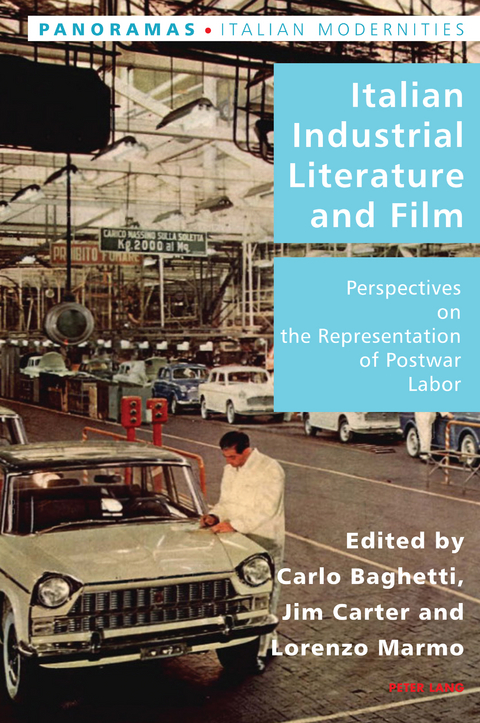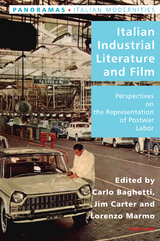Italian Industrial Literature and Film
Peter Lang International Academic Publishers (Verlag)
978-1-78874-598-7 (ISBN)
«Questo volume […] non si limita a descrivere, ma ricompone un quadro finora assente. I 37 capitoli che compongono questo volume-monstre dettagliano aspetti, figure, momenti spesso messi da parte nel dibattito. … Attraverso i diversi capitoli il lettore percepisce la pervasività [dell’industria] che si fa ideologema, le sue diverse realizzazioni e simbolizzazioni artistiche (cinematografiche e letterarie), e si rende conto che non si tratta solo di una «moda» o un momentaneo interesse dovuto a qualche intellettuale innamorato degli operai.»
(Carlo Tirinanzi De Medici, University of Pisa, in SigMa 6 (2022))
«Il libro rappresenta senza dubbio un’indagine preziosa sulla rappresentazione del lavoro e dell’industria nell’Italia del dopoguerra. Molte sono le piste che esso ha il merito di aprire, così come le domande e le questioni che mette in gioco.»
(Federico Pierotti, University of Picardie Jules Verne, in SigMa 6 (2022))
«L'autorevolezza del volume risiede principalmente in tre ragioni: la cornice teorica chiara ma al tempo stesso originale; il contributo e l’apporto dei maggiori esperti sul tema; la capacità di riflettere sulla letteratura industriale non solo a partire dalla cornice cronologica «classica» di questi saggi (che vanno grosso modo dall’inizio del boom economico alla fine degli anni Settanta), ma inserendola in un discorso che porta ai giorni nostri rendendo così tale letteratura una specificità nel contesto letterario italiano. … Un coraggioso tentativo di creare un canone letterario e cinematografico delle produzioni culturali industriali italiane.»
(Daniele Comberieti, Paul Valéry University Montpellier 3, in Annali d’Italianistica 40 (2022))
«…uno dei volumi più autorevoli sulla letteratura industriale.»
(Daniele Comberieti, Paul Valéry University Montpellier 3, in Annali d’Italianistica 40 (2022))
This book explores the representation of industrial labor in Italian literature and film from the 1950s through the 1970s. The first article of the postwar Italian Constitution states that the Republic is founded on labor. Forces across the political spectrum, from Catholic to communist, invested labor with the power to build a new national community after Fascism and war. The 1950s-1970s saw dramatic transformations, in economic, social and cultural terms, as labor moved from agriculture to industry and a whole generation of Italian writers and filmmakers used literature and cinema to interpret – and influence – these changes and to capture the new experiences of industrial labor. The essays in this book offer a comprehensive panorama of this generation’s work, examining key questions and texts, set against the context of history and theory, gender and class, geography and the environment, as well as their precursors and present-day successors.
Carlo Baghetti is a postdoctoral fellow at the Casa Velázquez in Madrid (École des Hautes Études Hispaniques et Ibériques). He holds a PhD in Italian Studies from Aix-Marseille Université and l’Università degli Studi «La Sapienza» di Roma. He is the editor of Il lavoro raccontato. Studi su letteratura e cinema italiani dal postmodernismo all’ipermodernismo (2020) and a special issue of Costellazioni (2020) dedicated to representations of work in Europe. Jim Carter is Lecturer of Italian at Boston University. His articles on Italian industrial culture, especially at the Olivetti company, have appeared in journals like Modern Italy and Italian Culture. In 2018–2019, he won a Rome Prize from the American Academy in Rome. Lorenzo Marmo is Associate Professor of Film Studies at Universitas Mercatorum and also teaches at the Università degli Studi di Napoli «L’Orientale.» In 2017, he was Lauro de Bosis Postdoctoral Fellow at Harvard University. He is the author of Roma e il cinema del dopoguerra. Neorealismo melodramma noir (2018).
Contents: History, Method, Legacy – Claudio Panella: Industrial Labor in Italian Literature and Film before Neorealism – Lorenzo Marmo: Spaces and Bodies of Industrial Labor in Italian Cinema, 1945– 1975 – Paola Bonifazio: A Short History of Sponsored Film in Italy – Jim Carter: For a New Humanism: Literary and Cultural Debate in Il Menabò di letteratura – Emanuele Zinato: The Factory as Cultural Center – Sergio Ferrarese: Alienation and Class Struggle in Italian Literature – Alessandra Diazzi: Care or Control? Psychology and Psychoanalysis in Italian Factories – Andrea Sartori: Class Struggle and Its Metamorphoses: A Path through Postwar Italian Political Thought – Ambra Zorat: Women and/ in the Factory – Piergiorgio Mori: Ecocritical Approaches to Factory Life – Paolo Chirumbolo: The City, the Countryside and the «Great Transformation» in Italian Industrial Literature – Francesca Cantore and Andrea Minuz: Against Working- Class Idols: Thieves, Vitelloni, Hunks and the Dolce Vita in 1950s Italian Cinema – Carlo Baghetti: Contemporary Returns to Questions of Industry and Labor – Malvina Giordana: Italian Cinema in the Twenty- First Century: Representing the Precarious Subject – Italian Industrial Literature – Ugo Fracassa: Luigi Davì: The Caliber of a Working- Class Writer – Fabrizio di Maio: Mechanization and Exploitation in Ottiero Ottieri: Tempi stretti (1957) and Donnarumma all’assalto (1959) – Tiziano Toracca: Giovanni Arpino’s Industrial Novels: Gli anni del giudizio (1958) and Una nuvola d’ira (1962) – Silvia Cavalli: Industrial Absurdities and Utopia in Giancarlo Buzzi’s Il senatore (1958) and L’amore mio italiano (1963) – Giovanni Capecchi: Failure and Solitude in the Boom Years: The Vigevano Stories of Lucio Mastronardi – Mark Pietralunga: Luciano Bianciardi and the New Frenetic Era of Labor – Daniele Fioretti: Writing the Factory: Paolo Volponi’s Industrial Novels – Ricciarda Ricorda: Reversing the Coming- of- Age Story in Industrial Society: Il padrone (1965) by Goffredo Parise – Pasquale Verdicchio: When Nothing Meets the Needs of Everything: Nanni Balestrini’s Vogliamo tutto (1971) – Pierpaolo Antonello: La chiave a stella (1978): Labor sub specie Faussone – Erica Bellia: Tommaso Di Ciaula’s Tuta blu (1978): The Voice and Body of the Working Class – Italian Industrial Film – Paola D’Amora: «Casa e lavoro»: Southern Labor and the Housing Problem in Eduardo De Filippo’s Napoletani a Milano (1953) – Anna Masecchia: Giovanna (1955) and the Others: Factory Women in Reconstruction Italy – Federico Vitella: Love Is Not a Many Splendored Thing: Pietro Germi’s L’uomo di paglia (1958) – Valerio Coladonato and Dalila Missero: Rocco e i suoi fratelli (1960): Patterns of Labor, Space and Integration – Veronica Pravadelli: Il posto (1961) and the Gender of Italian Modernity – Lucia Cardone: Earth and Water: The Market of Bodies in La ragazza in vetrina (1961) – Andrea Mariani: The Working Class in Post- Neorealist Italian Cinema: Times and Politics of Mario Monicelli’s I compagni (1963) – Eleonora Lima: The Factory as a Work of Art and an Alienating Force in Michelangelo Antonioni’s Deserto rosso (1964) – Luca Peretti: Italiani nel mondo (1965): The Glorification of Italian Labor Abroad – Louis Bayman: A Spanner in the Works: Elio Petri from Il maestro di Vigevano (1963) to La classe operaia va in paradiso (1971) – Ilaria A. De Pascalis: The Seduction of a Worker in Lina Wertmüller’s Mimì metallurgico ferito nell’onore (1972) – Mattia Lento: Migration, Industry and Class Struggle in Trevico- Torino: Viaggio nel Fiat- Nam (1973) – Appendix: Italian Industrial Literature and Film – A Tentative Canon.
| Erscheinungsdatum | 16.01.2021 |
|---|---|
| Reihe/Serie | Italian Modernities ; 40 |
| Mitarbeit |
Herausgeber (Serie): Pierpaolo Antonello, Robert S.C. Gordon |
| Zusatzinfo | 25 Illustrations |
| Verlagsort | Oxford |
| Sprache | englisch |
| Maße | 152 x 229 mm |
| Gewicht | 813 g |
| Themenwelt | Kunst / Musik / Theater ► Film / TV |
| Geisteswissenschaften ► Sprach- / Literaturwissenschaft ► Anglistik / Amerikanistik | |
| Geisteswissenschaften ► Sprach- / Literaturwissenschaft ► Literaturwissenschaft | |
| Geisteswissenschaften ► Sprach- / Literaturwissenschaft ► Romanistik | |
| ISBN-10 | 1-78874-598-1 / 1788745981 |
| ISBN-13 | 978-1-78874-598-7 / 9781788745987 |
| Zustand | Neuware |
| Haben Sie eine Frage zum Produkt? |
aus dem Bereich




